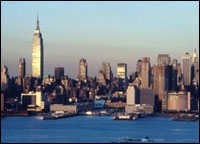Portland
-
Portland, emissions cuts, and the economy
I've had words with Nicholas Kristof before, but I suppose it's to his credit that he's finally discovered -- and publicized, in a way a lil' rag like Grist never could -- the fact that reducing greenhouse emissions is a profitable enterprise (via Gil Friend). It does not hurt the economy. It helps. Cities that do it save money and make themselves more desirable places to live and work. See: Portland.
"Portland's efforts refute the thesis that you can't make progress without huge economic harm," says Erik Sten, a city commissioner. "It actually goes all the other way - to the extent Portland has been successful, the things that we were doing that happened to reduce emissions were the things that made our city livable and hence desirable."
Putting caps on CO2 emissions would help the overall economy and the public, but it would hurt a few select industries. That's what Bush means when he says Kyoto would "destroy the economy" -- he means, "hurt my campaign contributors." Serving favored business interests is the driving principle of this administration, and Bush is willing to do anything -- even publicly snub Tony Blair, his closest and staunchest ally -- to serve that principle.
See also Matt Yglesias on the same subject.
-
The ranking of most eco-friendly cities gives too much weight to good intentions.
 Via Planetizen News, here's an interesting sustainability ranking for 25 US cities. Now, I haven't had time to look through the methods thoroughly. But my first impression is that it gives undue weight to intentions, and not enough to actual performance.
Via Planetizen News, here's an interesting sustainability ranking for 25 US cities. Now, I haven't had time to look through the methods thoroughly. But my first impression is that it gives undue weight to intentions, and not enough to actual performance.For example, Portland does exceptionally well in climate and energy policy, while New York City's rank on energy policy is only middling. But this only measures what cities say about energy, not what they actually do. In the real world, however, the climate doesn't care about good intentions. And in point of fact--at least where transportation emissions are concerned--Portland eats The Big Apple's dust. Gotham has by far the most energy efficient and climate-friendly transportation system in the U.S., largely because higher residential densities and a good mix of residences, jobs, and services let many New Yorkers get around on public transit or on foot. So even though Portland is doing a good job of talking the talk on energy efficiency, in New York City they're (literally) walking the walk.
That's not to say that Portland's energy policy is irrelevant, or that rankings like these aren't a useful exercise. Far from it. Still, actions speak louder than words -- and any attempt to measure sustainability should look far more closely at what cities actually do than at what their leaders say.
-
Lessons in environmentally friendly living from New York City
In 1975, Ernest Callenbach published a slim book called Ecotopia, in which the Northwest secedes from the United States and establishes itself as an ecological paradise. The text became a counterculture classic, and the term “Ecotopia” entered the lexicon, embodying the American tendency to think of the continent’s forested far coast as a land of […]
-
Umbra on environmentally friendly communities, again
Dearest Readers, In my last column, I received a plea from James “Captain Planet” Fitzpatrick of Florida, a firefighter looking to relocate to a small, friendly, environmentally conscious mountain community with good schools, reasonably clean air and water, and no polluting companies or toxic waste sites. As this was obviously a job for discerning Grist […]
-
Meredith Hall reviews Tinkering with Eden and Nature Out of Place
I love my hometown, but I have a bone to pick with a few of its inhabitants -- especially the green ones. It's not the lively Nader supporters of Portland, Ore., that I have hard feelings for, but rather the guileful botanic creepers that go by the common name English ivy. Botanic enemy number one is a luscious green forest dweller, a lazy gardener's groundcover, a symbol of old-world garden sophistication -- and, in Portland, an insidious invasive species. English ivy (Hedera helix, for the botanically savvy) infests more than half of the city's forests, choking out trees, ferns, and any other struggling forest undergrowth.

